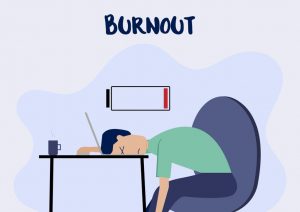What is Burnout?
We all can admit that we sometimes feel rather tired, and a bit fed up with our usual work life routine. The 9-5 office lifestyle can definitely be a challenge, and this can sometimes result in feeling a bit burnt out.
Burnout- a condition experienced by workers and other professionals, in which they develop depression-like symptoms as a result of aspects of their role.
What causes Burnout?
New data from a survey by Digital Detox, conducted by Just Eat for Business, has revealed that over a third (36%) of UK workers are now skipping more breaks than last year.
This survey also asked workers how often they put in overtime, with 25% of workers admitting that they put in overtime hours every single day.
Human capital management technology business Ceridian’s annual 2022 Pulse of talent report surveyed 1,156 UK members of staff in organisations with at least 100 employees, revealing that the vast majority have struggled with burnout.
As we all know in most office roles working overtime is rather normal, however quite often employees working the extra hours are not appreciated or rewarded and that is something that an employer should be keeping track of. Arguably- even though working in office roles normally would suggest that a few hours overtime a week is acceptable, making it the everyday norm could be an excessive amount of office hours for an employee.
More than three-quarters (79%) of UK workers have experienced burnout, with 35% reporting high or extreme levels, according to new research.
By ignoring early signs of burnout in staff unfortunately employers could be contributing to the long term effects; sooner or later, along with the adverse effects such as chronic fatigue, insomnia and low immune system, burnout could result in staff wanting to seek other employment.
At busier times of the year, employees may feel required to work the extra hours to ensure all tasks have been completed, however, during these times recognising what you do as an employer and implementing it into your employees’ routines is critical.
How to recognise burnout
Recognising burnout in employees is a helpful skill to acquire as an employer. Employers will help diminish the long-term effects, and ultimately will nurture better relations with their staff by designing a healthy and prosperous work environment. Mental Health UK helps us be aware of the early signs of burnout.
Common signs of burnout:
- Feeling tired or drained most of the time.
- Feeling helpless, trapped and/or defeated.
- Feeling detached/alone in the world.
- Having a cynical/negative outlook.
- Self-doubt.
- Procrastinating and taking longer to get things done.
- Feeling overwhelmed.
How can you prevent burnout in your employees?
When feeling burnout starting to occur in the office the easiest way to prevent it from spreading further would be to implement short-term solutions, now this would obviously be more beneficial than having no strategy, however, applying long term solutions from the start will allow for an efficient strategy for avoiding burnout moving forward.
Some tips for employers to follow could be:
- make objectives clear – by stating clear tasks from the start this will dimmish any areas of confusion for the employee
- ensure adequate training is provided – clear training from the start will be beneficial for both parties
- provide support – remember to ask your staff if they need your help, this will not only help build trust but better relations between you both
- keep lines of communication open – ensure that employee understands they have somewhere to go if they are struggling
- promote better work life balance – develop your culture, ensure this is portrayed clearly and states who you are as a business
Some ideas employees can undertake to help themselves: (from MINDTOOLS)
- Work with purpose – try to find an element of your work each day that you love to do, make it a priory and look forward to it!
- perform job analysis – regularly take breaks, see what’s next on your to-do list and try not to overwhelm yourself
- exercise regularly – regular exercise release endorphins helping to contribute to your wellbeing
- give to others – small acts of kindness can boost feelings of confidence, of being in control, happiness and optimism (mentalhealth.org.uk)
How can we help?
If you want advice on putting in place a wellbeing policy or ideas on creating a healthy workplace culture, contact us at [email protected] or call us on 03338880290.
For advice on managing employees with sickness absence or performance issues have a look at the free resources on our sister site www.bhayanilaw.co.uk
We are in Your Corner
For advice or for a free assessment contact us today







